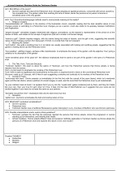A-Level Literature: Revision Guide for Twicknam Garden
AO1: BIG IDEA(s) of the poem?
● Donne’s satirises the ideal of the Petrarchan lover, through adopting an egotistical persona, consumed with sorrow caused by
his unrequited love. The garden rather than soothing the ache of deceit, taunts the persona as he yearns to become a
senseless piece of the very garden.
AO2: Top 5 form/structure/language methods used to communicate meaning to the reader?
1. Religious Imagery
“transubstantiates all”- reference to the doctrine of the Eucharistic church, simplistic reading that the dark deceitful nature of love
changes people or submitting to a Petrarchan lover changes you as a person, could also relate to his apostasy between Catholicism
and Anglicanism
“serpent brought”- animalistic imagery intertwined with religious connotations, as the serpent is representative of the primal sin of the
Garden of Eden, and relates to the concept of original sin {that evil is innate in all human beings}
“manna to gall”- Catholic inspired imagery, with the manna being the bread of heaven, and the gall is bile, suggesting that deceitful
nature of love changes a person from being part of Christ, to a bodily fluid, that isn’t pleasant
2. Blessing the Garden
“such balms”- has quite a soothing tone to it, as balms are usually associated with healing and soothing people, suggesting that the
garden is healing Donne (as the Petrarchan lover)
“true paradise”- uplifting imagery, perhaps a little melodramatic, to emphasize the beauty of the garden, with the adjective “true” giving a
certainty to his description of the garden
“some senseless piece of this place be”- the sibilance emphasizes that he wants to be part of this garden in the eyes of a Petrarchan
lover
3. The Title, Form, Tone and Structure
“Twicknam Garden”- this poem is about the patron of Twicknam, and how this Petrarchan persona that Donne adopts, is facing
rejection from the woman
Form- a lyrical poem to emphasize his mocking of the Petrarchan lover
Tone- there is quite an egotistical and mocking tenor to this poem, to express Donne’s views on the conventional Petrarchan lover
Structure- made up of 3 stanzas, with 9 lines in each suggesting a certainty and continuity to his mockery of the Petrarchan lover
4. Conceit of Tears
“surrounded with tears”- Donne presents us immediately (in the first line) with the conceit of the poem {tears}, which isn’t mentioned
again until the last stanza, where a plethora of conceit imagery is used, sets the mood that the Petrarchan lover is just melodramatic
“try your mistress’ tears at home”- he explains that if you cry into the “crystal vials” {glass containers} and try them, and they don’t taste
like your own, then your love for each other isn’t true. It taps into the idea of Neo-Platonism as it suggests that your souls are not
bonded together if your tears do not taste the same as your partners
“that taste not just like mine”- emphasizes that only his tears show true love
5. Deception
“spider love”- oxymoron accentuates the dark and snaring nature of love
AO3: RELEVANT contextual considerations?
● Donne’s apotasy
● Petrarchan lover
● Twicknam Garden was a traditional Renaissance garden belonging to Lucy, Countess of Bedford, who was Donne's patroness
AO5: Possible interpretations and/or useful critical quotations?
Feminism- perhaps the fact that the patroness rejected the persona that Donne adopts, shows the progression in women
standing up for themselves, and following their hearts
Achsah Guibbory- “Donne adopts different roles and postures" definitely applicable to Twicknam Garden as Donne adopts the
persona of a Petrarchan lover and explores the nature of one, and mocks it
Possible THEMES?
● Petrarchan
● Mockery
● Religion





